Periodontics & Gum Disease Treatment
New You Dental Center offers both minimally invasive and surgical periodontal treatment to help patients with gum disease and gum recession. With a focus on minimally invasive techniques and, when necessary, advanced surgical procedures, our team is dedicated to helping you maintain your gum health. Schedule your appointment today at one of our five dental clinics in Michigan: Auburn Hills, Flint, Lansing, Livonia, or Southfield.
To determine if you have gum disease, assess its severity, and recommend the appropriate treatment, our periodontist will:
- Review your medical history
- Examine your month to look for plaque and calculus and check for bleeding.
- Measure the pocket depth
- Take dental X-rays
Gum Disease
Gum disease, also known as periodontal disease, is a broad term for infections and inflammation of the gums and supporting structures around the teeth. It’s caused by bacteria in plaque, which can build up if not cleaned away properly. Gum disease progresses in stages:
- Gingivitis: The early stage of gum disease, where gums may appear red and swollen.
- Periodontitis: Advanced stage where the infection affects the supporting bone, causing deeper pockets between the teeth and gums. This can lead to tooth and bone loss if not treated on time.
Gum Recession
Gum recession is a specific form of gum disease characterized by the gradual pulling away of gum tissue from the teeth. This process exposes more of the tooth surface or, in more severe cases, the tooth root itself. As the gums recede, the teeth become more vulnerable to external factors, which can increase tooth sensitivity. Receding gums also create gaps where harmful bacteria can accumulate, raising the risk of tooth decay and other dental issues if not addressed. Although gum disease is a common cause of gum recession, it is not the only factor. Other causes, such as aggressive tooth brushing, genetic predisposition, or trauma to the gums, can also contribute to the development of receding gums. Addressing these underlying causes and seeking treatment early can help protect your gum health and maintain your smile.
Periodontal Disease Will
Not Go Away by Itself
Taking action early is the best way to keep your gums healthy. Gum disease can often be managed with deep cleaning techniques like scaling and root planing, which remove harmful plaque and tartar. If ignored, gum disease may progress to the point where surgery is needed to save your teeth. While early intervention is ideal, if conditions progress, we also offer surgical treatments to restore gum health.
Symptoms of Gum Disease
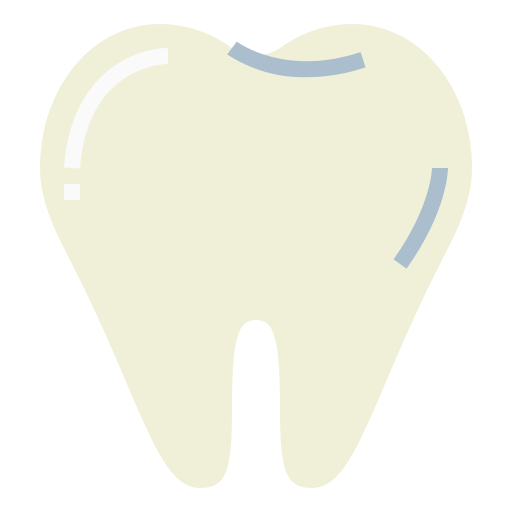
Sensitive Gums and Teeth
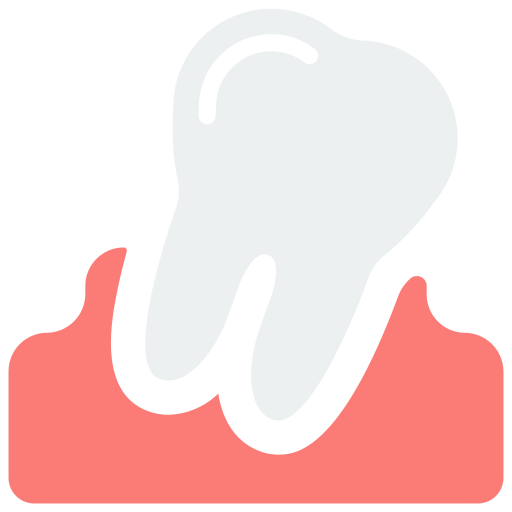
Gum Recession and Loose Teeth
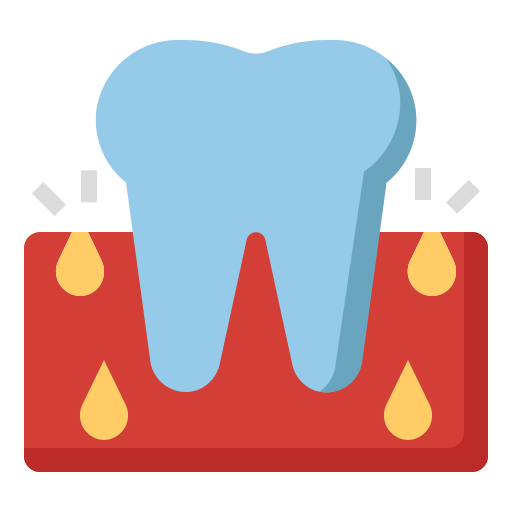
Dental Abscesses
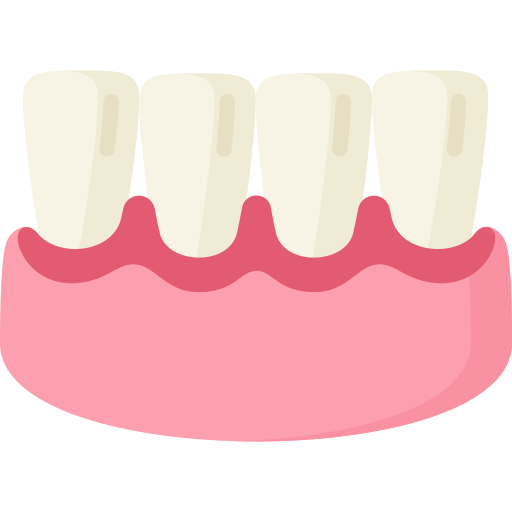
Bleeding, Red or Swollen Gums

Bad Breath or a Persistent Bad Taste
How We Treat Gum Disease
New You Dental Center offers treatments to address gum disease at every stage.
1. Early Treatments
For early stages of gum disease or mild gum recession, we offer minimally invasive treatments designed to stop disease progression and protect your smile. We use scaling and root planing (also known as deep cleaning) to remove plaque and tartar from below the gumline, smoothing the root surfaces to prevent bacteria from reattaching. Scaling and root planing is effective for managing early gum disease and can slow gum recession.
2. Surgical Treatments
If gum disease has progressed or gum recession has become severe, surgical treatments may be recommended to restore gum and bone health. We offer both gum grafting and periodontal bone grafting to treat different issues within the gums and bone structure around the teeth:
- Gum Grafting: Gum grafting is a procedure used to treat gum recession, where the gum tissue has pulled back from the teeth, exposing more of the tooth or even the tooth root. During a gum graft, healthy gum tissue (either from the patient’s mouth or a donor source) is placed over the areas where gums have receded. The goal of gum grafting is to cover exposed tooth roots to reduce sensitivity and prevent further gum recession.
- Periodontal Bone Graft: If gum disease has caused bone loss, a bone graft can help rebuild the structure around teeth. In a bone graft, bone material (from the patient, a donor, or synthetic sources) is placed in areas where bone density has decreased.
Will Insurance Cover My Periodontal Treatment?
Our insurance coordinator will check if periodontal treatment will be covered fully by your insurance. If your treatment is not fully covered by insurance, we offer several forms of financing for dental treatment plans. Having periodontal treatment now may be less expensive than replacing a tooth lost to disease.
Mouth-Body Connections
Here are a few of the many health problems that can be aggravated with poor oral hygiene:
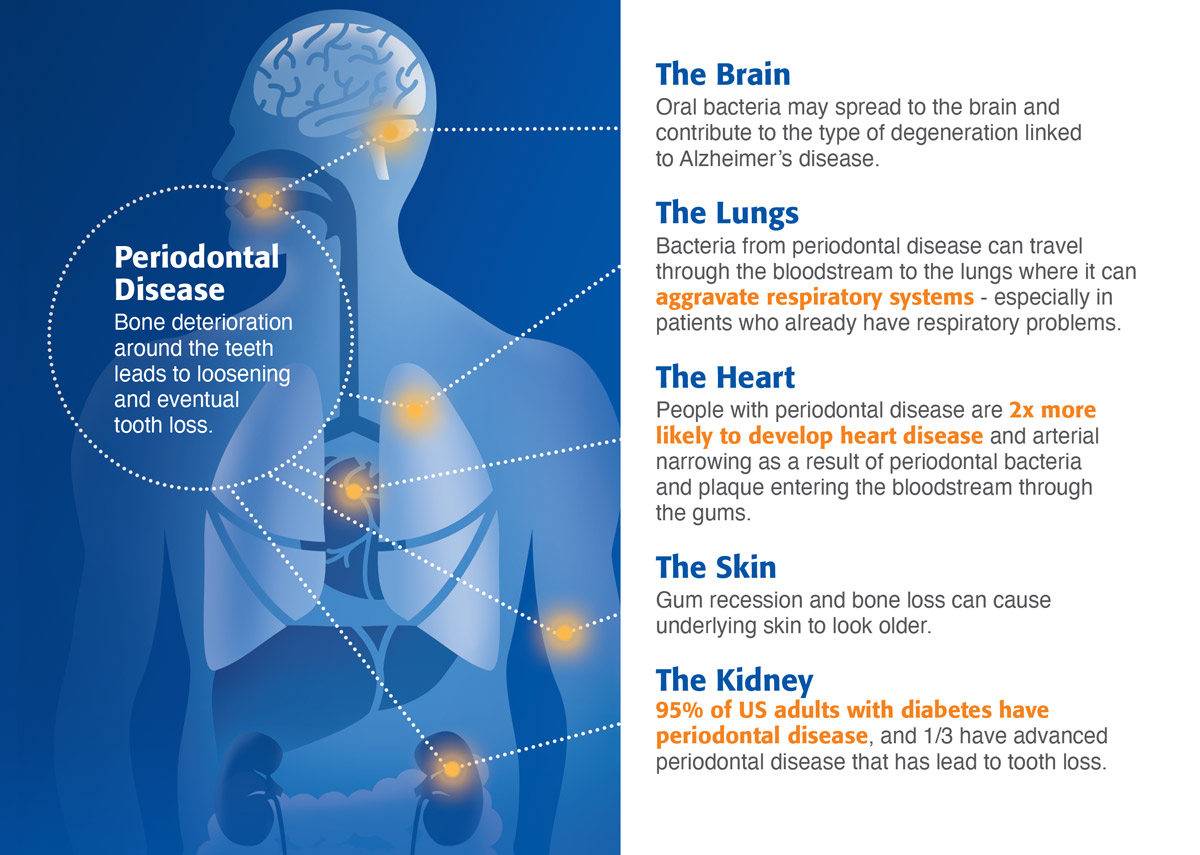
Post Periodontal Treatment Home Care Instructions
Your dentist has treated your gum disease, but you must also do your part at home.
Brush and clean between your teeth every day, eat a healthy diet and schedule regular dental visits.
Schedule Your Appointment
Auburn Hills
4139 Baldwin Rd
Auburn Hills, MI 48326
Flint
4307 Miller Rd
Flint Township, MI 48507
Lansing
3201 E. Grand River, Suite E.
Lansing, MI 48912
Livonia
29475 Plymouth Rd.
Livonia, MI 48150
Southfield
30555 Southfield Rd.
Suite 310, Southfield, MI 48076